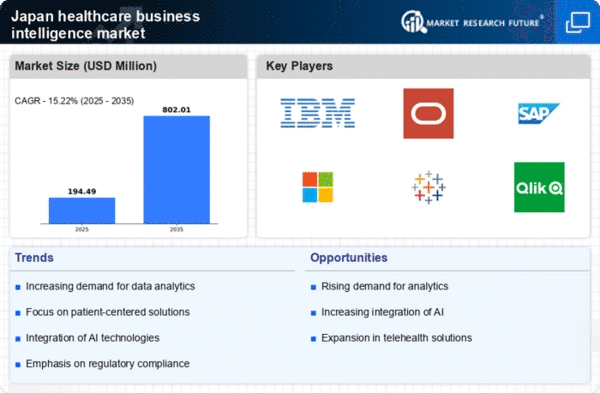Increased Focus on Patient-Centric Care
The healthcare business-intelligence market in Japan is significantly influenced by the increasing focus on patient-centric care. As healthcare providers aim to enhance patient experiences and outcomes, the demand for analytics that can provide insights into patient preferences and behaviors is rising. This trend is evidenced by a reported 20% increase in the utilization of patient feedback data in decision-making processes. By leveraging business-intelligence tools, healthcare organizations can tailor services to meet the unique needs of patients, thereby fostering loyalty and satisfaction. This patient-centric approach not only drives improvements in care delivery but also propels the growth of the healthcare business-intelligence market as organizations seek to better understand and serve their patient populations.
Rising Demand for Data-Driven Decision Making
The healthcare business intelligence market in Japan is experiencing a notable surge in demand for data-driven decision-making processes. Healthcare providers are increasingly recognizing the value of leveraging data analytics to enhance operational efficiency and improve patient outcomes. This trend is underscored by a reported increase in the adoption of business-intelligence tools, with a projected growth rate of approximately 15% annually. As healthcare organizations strive to optimize resource allocation and streamline workflows, the integration of advanced analytics into clinical and administrative functions becomes paramount. Consequently, the healthcare business-intelligence market is poised for expansion as stakeholders seek to harness the power of data to inform strategic decisions and drive innovation.
Technological Advancements in Data Management
Technological advancements in data management are reshaping the landscape of the healthcare business-intelligence market in Japan. The emergence of cloud computing, big data analytics, and real-time data processing capabilities is enabling healthcare organizations to manage vast amounts of data more effectively. This evolution is driving the adoption of business-intelligence solutions that can provide timely insights and support informed decision-making. The market is projected to grow at a rate of 12% annually as organizations seek to leverage these technologies to enhance operational efficiency and patient care. As data management technologies continue to evolve, the healthcare business-intelligence market is likely to witness significant growth, driven by the need for more sophisticated data handling capabilities.
Integration of Advanced Analytics in Clinical Workflows
The integration of advanced analytics into clinical workflows is a pivotal driver for the healthcare business-intelligence market in Japan. Healthcare institutions are increasingly adopting sophisticated analytical tools to enhance diagnostic accuracy and treatment efficacy. This shift is reflected in a growing investment in analytics solutions, which is expected to reach $1 billion by 2026. By embedding analytics into everyday clinical practices, healthcare providers can gain actionable insights that lead to improved patient care and operational performance. The emphasis on data-driven clinical decision-making not only enhances patient outcomes but also positions the healthcare business-intelligence market as a critical component in the evolution of healthcare delivery in Japan.
Regulatory Compliance and Quality Improvement Initiatives
Regulatory compliance and quality improvement initiatives are critical drivers for the healthcare business-intelligence market in Japan. With stringent regulations governing healthcare practices, organizations are compelled to adopt business-intelligence solutions that facilitate compliance and enhance quality of care. The market is witnessing a shift towards solutions that not only ensure adherence to regulations but also promote continuous quality improvement. This is reflected in a projected increase in spending on compliance-related analytics tools, which is expected to reach $500 million by 2025. As healthcare providers prioritize quality and compliance, the healthcare business-intelligence market is likely to expand, offering innovative solutions that address these pressing needs.
























Leave a Comment